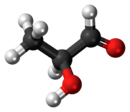Lactaldehyde
|
|
|||
| Names | |||
|---|---|---|---|
|
IUPAC name
2-Hydroxypropanal
|
|||
| Other names
Hydroxypropionaldehyde
|
|||
| Identifiers | |||
|
598-35-6 3946-09-6 (R) 3913-64-2 (S) |
|||
| 3D model (Jmol) | Interactive image | ||
| ChEBI |
CHEBI:18419 |
||
| ChemSpider |
832 |
||
| ECHA InfoCard | 100.237.284 | ||
| KEGG |
C05999 |
||
| PubChem | 855 | ||
|
|||
|
|||
| Properties | |||
| C3H6O2 | |||
| Molar mass | 74.08 g·mol−1 | ||
| Related compounds | |||
|
Related aldehydes
|
Glycolaldehyde |
||
|
Except where otherwise noted, data are given for materials in their standard state (at 25 °C [77 °F], 100 kPa).
|
|||
|
|
|||
| Infobox references | |||
Lactaldehyde is an intermediate in the methylglyoxal metabolic pathway. Methylglyoxal is converted to D-lactaldehyde by glycerol dehydrogenase (gldA). Lactaldehyde is then oxidized to lactic acid by aldehyde dehydrogenase.
Lactaldehyde exists in several forms: in open-chain form and as cyclic hemiacetal; in solution and in crystal forms; as monomer and as dimer. In crystal form, three conformers occur as hemiacetal dimers with a 1,4-dioxane ring skeleton:
In equilibrium solution, negligibly small amounts of the monomer and at least one five-membered ring dimer exist.
...
Wikipedia


